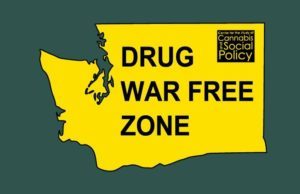by Dominic Corva, Social Science Research Director
After further review, it’s very clear how to respond to the WSLCB regulated home grow options. I choose, if it matters, Option 3, the status quo. This post is about why, and to ask my readers to shape their feedback accordingly.
The WSLCB has delivered a perfectly reasonable set of options to the legislature’s mandate that they carry out a study on the feasibility of regulated home grow. They have been asked only to deliver options for a kind of home grow that is unlike any of the other 8 states and the nation’s capital, in that it would not apply to all adult citizens residing in the State. It would apply only to those who apply for it, as a privilege that could be taken away or prevented by the entity that manages those permits, whether it be local law enforcement or the WSLCB.
By contrast, all other State home grow laws allow for home grow as a right. For them, being an adult citizen means having the liberty to grow a few plants without having to ask for permission or be tracked or be subject to anything that would infringe on the right to privacy. Home grow in all the other states is a civil liberty.
The WSLCB is not an arm of the State concerned with the expansion or protection of civil liberties. It is an entity charged with creating, regulating, and policing legal cannabis businesses. Thus, the stakeholders they consult about home grow are businesses, not civil liberties watchdogs like the ACLU, which funded our State legalization initiative. I 502 was, and should always be, a civil liberties law that SECONDARILY creates a market from which the State can tap revenue.
The WSLCB is institutionally incapable of prioritizing the civil liberties of adult citizens assumed responsible. As a private police force, it can and does assume adult citizens are potential vectors of illegality, not stakeholders in a civil liberties experiment.
As a business regulator, it has no expertise or mandate to govern adult civil liberties. Its Board contains no representatives of any group that has either. Thus, the proper entity for considering and designing adult home grow as a civil liberty in the State of Washington is the Legislature.
The Legislature must consider more than just options for regulated home grow. They must carefully study the Cole Memo and understand how its parameters allow for adult home grow as a civil liberty.
The Cole Memo is a set of guidelines, not a blueprint for making law or policy. It is exclusively about the legal markets regulated by entities such as the WSLCB. The concern for diversion is exclusively about making sure each State’s regulated cannabis markets do not become mixed up with black market activity — diversion into, and out of, the regulated market, with clear emphasis on diversion to other states.
An adult homegrow provision in this State carves out a space that is simply out of the jurisdiction of the WSLCB. Adult home grow, as a civil liberty, would be unregulated, because adult home grow would not be part of the regulated system. No need to worry about policing diversion, because no one would be diverting from a regulated system. That’s how it works in 8 other States and the District of Columbia. It would literally be none of the WSLCB’s business.
We need our Legislature to listen to civil liberties experts, particularly those associated with the success of I 502 like the ACLU, Alison Holcomb, and even Rick Steves. Ask them what the spirit of I 502 is, whether adult use home grow like adult use possession, sharing, and consumption should be decriminalized.
The reason why the ACLU will respond quite differently from the WSLCB, or the industry stakeholders to whom they might listen, is because the ACLU has experts in the history and practice of illicit drug prohibition, and must include that expertise in any consideration of the matter at hand.
It would be much more helpful if the Legislature could consult a standing body of drug policy experts that have published on and studied racial disparities and punishment in the U.S. This is perhaps the fundamental thing missing from Washington State’s approach to legalizing cannabis: the ACLU is never consulted. By default, only the legal cannabis police are consulted, and they interpret their mandate broadly enough to consider the risk of adult home grow as an exceptional threat to Cole Memo compliance on the one hand; and the legal cannabis industry on the other.
There are many more arguments that can and will be made. But these are the fundamental ones.
I 502, and cannabis legalization at large, are about promoting civil liberties and reducing the scope of the punitive State, which in all cases increases racial disparity because of structural racism. Every other State subject to the Cole memo guidelines has created adult home grow as a civil liberty, and it is highly unlikely that following this path would invite Federal intervention. Finally, the expressed concerns about diversion in the Cole Memo are about policing the integration of organized crime into State-legal markets, and are not concerned at all with what happens on a vanishingly small scale in the privacy of adult homes.
So I urge all of my readers who are interested in providing feedback to the WSLCB on its home grow options to choose option 3, the status quo, because adult use home grow should be a civil liberties issue, not a regulated business issue. We thank them for doing what they were asked by the Legislature to do, and choose to focus instead on working for Legislative change, including the two existing civil liberties home grow bills still in process that will be taken up again in January.

Too many home-runs in a row poses the potential problem of unreasonable expectations, going forward Dr. Corva.
Elegantly beautiful simplicity!
Is this what truth looks like?
Keep up the excellent work.